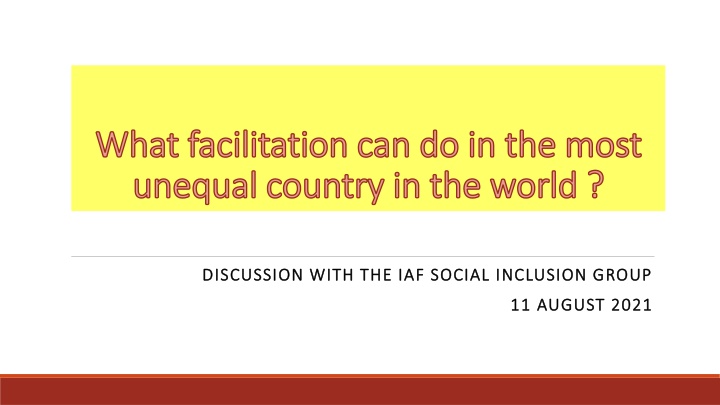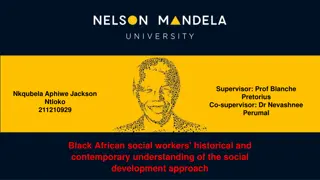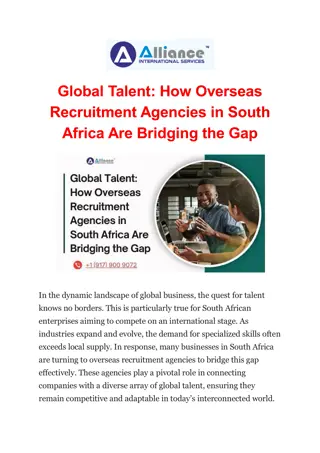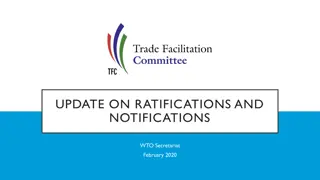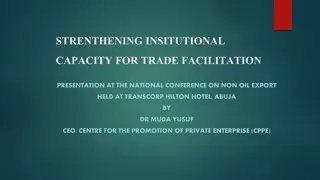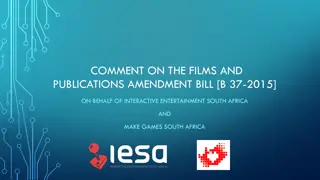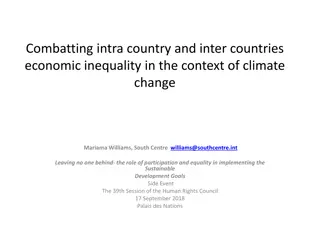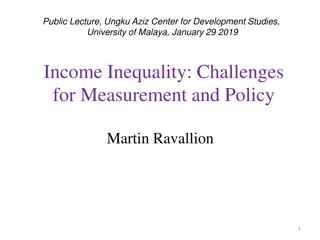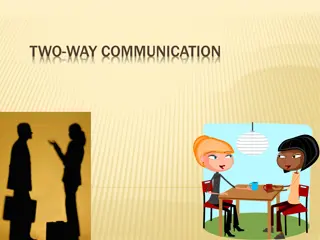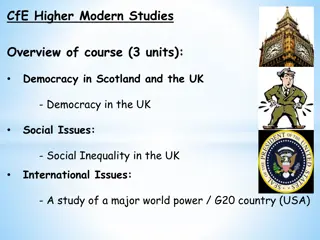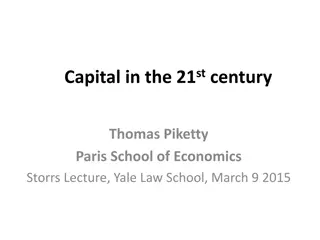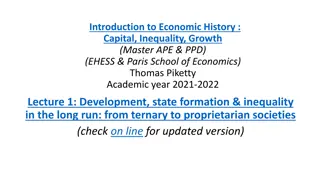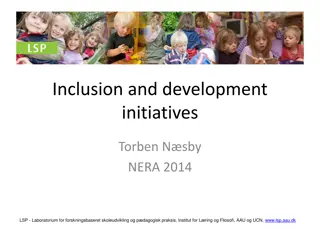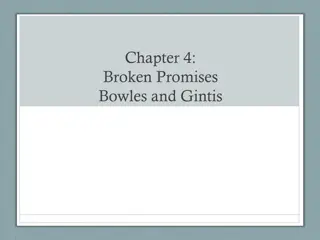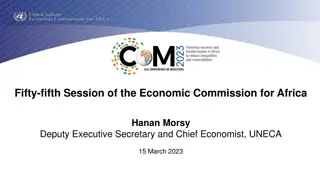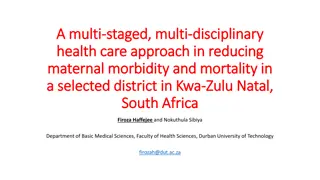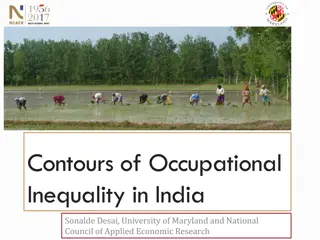Addressing Inequality in South Africa: Role of Facilitation in Social Inclusion
In a deeply unequal country like South Africa, with significant disparities in wealth distribution, employment opportunities, and social issues, effective facilitation can play a crucial role in promoting social inclusion, reducing inequality, and fostering systemic change. Factors such as high unemployment rates, racial and gender biases in the labor market, and reliance on social grants highlight the need for strategic facilitation to address various facets of inequality. This discussion with the IAF Social Inclusion Group on August 11, 2021, sheds light on the challenges and opportunities for utilizing facilitation as a tool for positive social change in South Africa.
Download Presentation

Please find below an Image/Link to download the presentation.
The content on the website is provided AS IS for your information and personal use only. It may not be sold, licensed, or shared on other websites without obtaining consent from the author.If you encounter any issues during the download, it is possible that the publisher has removed the file from their server.
You are allowed to download the files provided on this website for personal or commercial use, subject to the condition that they are used lawfully. All files are the property of their respective owners.
The content on the website is provided AS IS for your information and personal use only. It may not be sold, licensed, or shared on other websites without obtaining consent from the author.
E N D
Presentation Transcript
What facilitation can do in the most What facilitation can do in the most unequal country in the world unequal country in the world ? ? DISCUSSION WITH THE IAF SOCIAL INCLUSION GROUP DISCUSSION WITH THE IAF SOCIAL INCLUSION GROUP 11 AUGUST 2021 11 AUGUST 2021
Scenes looting and rioting South Africa July 2021
Overview Inequality in perspective State roles split across national, provincial and local government Local government roles Policy making role Local Economic Development Integrated Development Plans Public Participation State of local government A City in Pieces
Facets of Inequality in South Africa Gini coefficient measure inequality 0 = perfectly equal distribution of wealth; 1 = one person owns everything Gini coefficient in South Africa of 0,67 in 2006, dropping to 0,65 in 2015 (Stats SA); expected to be 0,63 in 2021 (World Population Review) Palma ratio - top 10% of the population spent 8,6 times more than the bottom 40% in 2006; ratio reduced to 7,9 in 2015 South African labour market is heavily racialised and gender-biased Largest contributor to overall income inequality came from the labour market at 74,2%. Female workers earn approximately 30% less, on average, than male workers Mean real earnings between 2011 and 2015 amongst employed black Africans was R6 899 (real earnings) p. m. Mixed race & Indians/Asians - R9 339 and R14 235 p. m. For Whites, it was R24 646 per month
Facets of Inequality in South Africa - 2 Eastern Cape - highest levels of inequality in 2015, with the Western Cape and Mpumalanga coming in second The bottom 60% (9.66m) of households depend more on social grants and less on income from the labour market (57.7 million people & 16.1 million / households in South Africa) Prof Ranchod UCT inequality prime cause - high levels of unemployment Unemployment - leads to income inequality - black people and women in South Africa are adversely affected 32.6% / 43.2% (expanded) / 46.3 youth June 2021 Inequality manifests in different ways - gender inequalities, urban and rural dweller inequalities, education inequalities, and racial inequalities Short of massively disruptive social change, in the form of revolutions, what we need is a policy system which thinks systematically and substantially. (21 May 2021)
State of Housing Inadequately Housed Informal dwelling/shack not in backyard, e.g. in an informal/squatter settlement or on farm: 1 334 598 (8.2%) Traditional dwelling/hut/structure traditional materials: 897 592 (5.5%) Informal dwelling/shack in backyard: 869 229 (5.4%) Unemployment in informal settlements up to 80% 13.6 % of SA in informal housing 2.2m households
Policy Context Freedom Charter - There shall be houses, security and comfort Constitution of South Africa - Chapter 2: Bill of Rights - Everyone has the right to have access to adequate housing, jobs etc Econ Dev Policy many constraints: Wholesale programmes from national agency lack of system for training / accrediting trainers funding framework lacking for NGOs - Need fixed address for finance Limited & uneven access at local level & Partial support for cooperatives Premises, land, equipment scarce & complex to assess Dispersion across silos Weak educational and technical foundations Poverty mentioned everywhere though approach dispersed and unfocused
Core Pillars of Revised Led FW Building a diverse & innovation driven local economies Developing inclusive economies Enterprise development & support Developing learning and skillful economies Economic Governance and Infrastructure Strengthening Local Innovation Systems
Integrated Development Planning - IDPs Local municipalities in South Africa have to use "integrated development planning" - method to plan future development in their areas: Motivation: Integrate - racially divided business and residential areas Overcome bad planning to cater for the poor - with long travelling distances to work and poor access to business and other services Reduce - great differences in level of services between rich and poor areas Informal settlements and spread out residential areas economical service delivery difficult Effective use of scarce resources Speed up delivery Attract investment
Public Participation IDP Representative Forum be established to encourage the participation of communities and other stakeholders Provide an opportunity for stakeholders to represent the interests of their constituencies. Provide a structure for discussion, negotiations and joint decision making Ensure proper communication between all stakeholders and the municipality Monitor the planning and implementation process Strategy for public participation Key Role of Council The roles of the different stakeholders during the participation process Ways to encourage the participation of unorganised groups Method to ensure participation during the different phases of planning Timeframes for public and stakeholder response, inputs and comments Ways to disseminate information Means to collect information on community needs
State of Local Government Service Delivery Protests Alexandra Township, April 2019
State of Local Government (Mbanyele, May 2021, Good Governance Africa) Local governance - focus on public administration, factoring in transparency, accountability, and efficiency Yet widescale evidence of mismanagement - poor audit outcomes & exposure of irregular and wasteful expenditure in those audits No material consequences for this malfeasance Root cause corruption, lack of credible accountability structures and individual agency characterised by impunity Dysfunction in many of the country s municipalities: Political infighting - Drawn-out court cases Dissatisfaction has led to pressure to form coalitions led to instability and poor governance
Sorry Tale of City in Pieces https://www.newframe.com/pietermaritzburg-a-city-in-pieces/ Zama, L , July 2021 Widespread looting and destruction in Pietermaritzburg could signal the death knell for a place already brought to its knees by municipal neglect and the greed of those in power. Gunfire, smoke and mounting rubble on every street are becoming average. midst of the pandemic that forced us to stay at home, some of us spent five days without electricity, persistent dereliction of municipal duty has seen Pietermaritzburg fall into decay. The result is that it has become one of the most murderous parts of the country. Human life is worth less here than almost anywhere else in South Africa, Filth is nothing new to communities that have to remind the municipality that it is supposed to pick up the trash on certain days. Looting, however, is deeply unnerving. It is a bridge too far and many young families are now wearily reconsidering the feasibility of allowing themselves to be at the mercy of the criminal elements among the rioters that hit the city
Sorry Tale of City in Pieces https://www.newframe.com/pietermaritzburg-a-city-in-pieces/ Zama, L , July 2021 The people of this once-proud city are exhausted. When grown children have to sleep in their mothers beds as fathers stand guard with whatever weapons they can find, you know you have breached human rights and moved into collective wrongs. This was a city of endurance, characterised by the ultra-distance marathon that started or stopped here. But that emotional well of perseverance seems to have run as dry as the petrol stations in the area.
Options for an Inclusive Future Go back to street committees as form of community organisation More NGO interventions Gift of the Givers, SERI Social Movements A Mall is NOT development. Township Malls are instruments of poverty and exploitation vs local production Policy on 70% local for certain goods/merchandise - Malls to set aside 30% of floor space for local business. Restrict big cartel anchors like Checkers/Shoprite to one shop per mall per 20km radius.
Group discussion: What can be the role of facilitation in supporting inclusive development?
